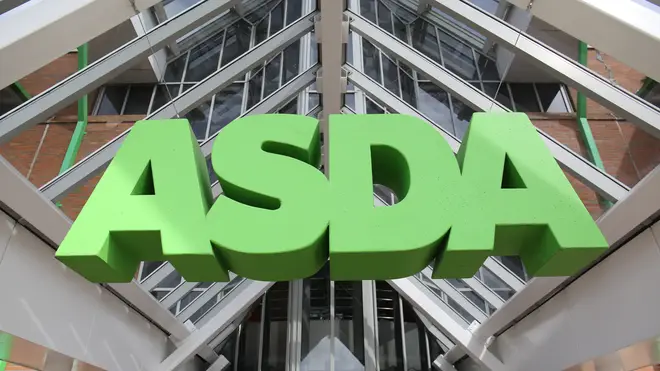
Nick Abbot 10pm - 1am
22 April 2024, 08:44

The UK’s third biggest supermarket chain said its underlying earnings rose by 24% to £1.1 billion over 2023.
Asda has revealed its underlying earnings swelled by a quarter last year with growth in food and clothing sales.
The UK’s third-biggest supermarket chain said its underlying earnings, before additional costs like tax and interest, rose by 24% to £1.1 billion over 2023, compared with 2022.
It came as supermarket sales, excluding fuel, grew 5.4% on a like-for-like basis, which excludes the impact of new stores opening during the year.
Total sales, excluding fuel, hit nearly £22 billion during the year, as the chain said it had benefited from about six million customers now using its loyalty app to shop with the retailer.
Around half of all sales are linked to its reward programme, Asda Rewards, which it described as a “key revenue driver” for the business.
The group, which runs fashion retailer George, said clothing sales edged up by 3.4% to total £1.5 billion.
George is the UK’s biggest retailer for childrenswear and is known for its back-to-school ranges.
Michael Gleeson, Asda’s chief financial officer, said price rises helped drive higher sales through the year as the retail industry experienced “significant inflation”.
“Inflation has reduced significantly into the beginning of 2024 – it still isn’t back to where it was maybe three to 10 years ago, but it has reduced,” he said.
Mr Gleeson stressed that the chain had “tried very hard to protect customers from the worst impacts” of inflation, including by pledging to match the prices of hundreds of items to those sold at rivals Aldi and Lidl.
At the start of the year, Asda saw its share of the grocery market slip to about 13.6%, trailing behind traditional supermarket rivals Sainsbury’s and Tesco, and as German discounters Aldi and Lidl continued to grow their customer base, according to data from Kantar.
Mr Gleeson acknowledged that the retailer has lost market share over the past 15 years to Aldi and Lidl, adding: “Tesco and Sainsbury’s managed to insulate themselves a little bit by growing out into the convenience business.
“I think that was clearly a gap that we needed to address and that’s what we’ve been doing over the last 18 months, and we now have just short of 500 convenience stores.”
Asda bought petrol forecourts from EG Group and Co-op in recent years, which has allowed it to expand its convenience store business.
It has 479 Asda Express stores, compared with just three in September last year, and expects to run 500 by the end of the year.
Mohsin Issa, Asda’s co-owner, said: “We continue to strengthen the business by expanding in the growing convenience and food-to-go sectors, leveraging our loyalty app and driving innovation in online grocery where we are the UK’s second-largest supermarket.”
The publication of its annual results comes amid reports that Mr Issa’s brother, Zuber Issa, is getting ready to sell his stake in the group to private equity group TDR Capital, according to reporting in Bloomberg.
The Issa brothers joined forces with TDR to buy Asda three years ago.